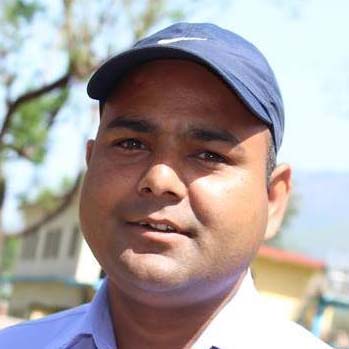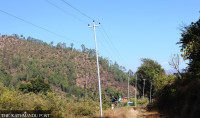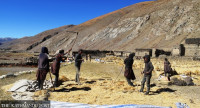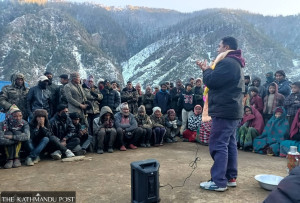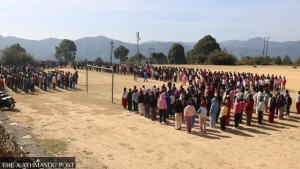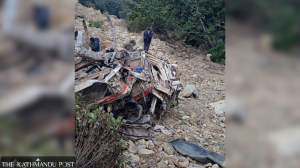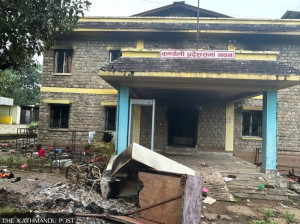Karnali Province
Bheri river’s sand and fish are vanishing fast and threatening livelihoods
Generations of Badi people have lived off the river, but electrical fishing, commercial sand mining, and construction are putting their survival at risk.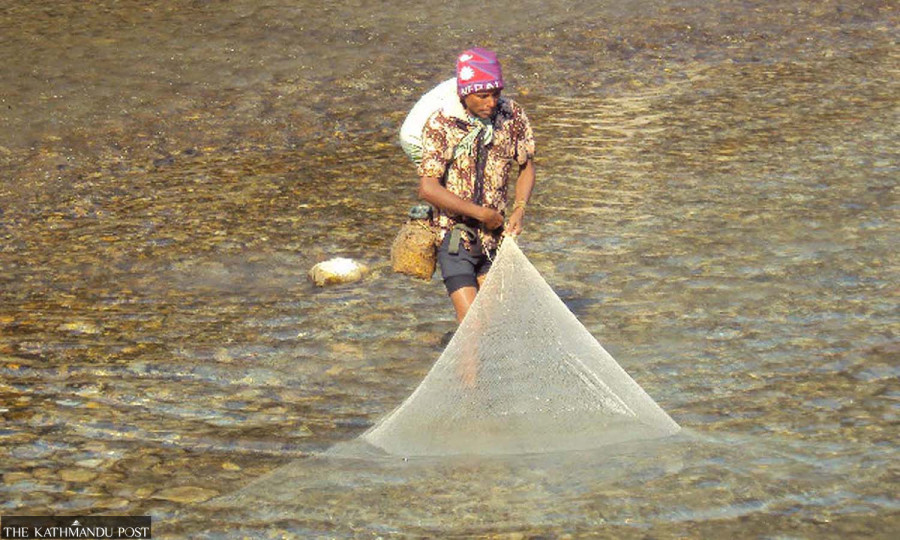
Krishna Prasad Gautam
Along the winding banks of the Bheri river, thousands of lives and livelihoods are intricately tied to its waters. For many like Ranjan Badi, aged 39, of Radi in ward 9 of Athbiskot Municipality of West Rukum, the river is more than a source of income—it's a legacy.
“Every evening I set a trap in the Thuli Bheri. By morning, I collect around three to four kilograms of fish,” said Ranjan. “That’s how I feed my family and pay for my children’s education.” His wife Janaki collects sand from the river during the day, while their two sons, Sudan and Gaurab, help when they can.
This riverside way of life spans generations. Ranjan's grandfather and father lived and worked along the Bheri, and he had no desire to leave. “Even in the rainy season, we collect logs the river washes ashore and sell it to get by,” he said.
His uncle Dev Singh Badi, aged 64, supports a nine-member family through similar means. His sons fish, while his wife and daughters-in-law collect sand between October and April. “I’ve seen the Bheri calm and cruel. But our bond with this river is unbreakable,” he said.
The Badi community, one of the country’s most deprived and marginalised groups, settled in the Radi area around 1961. “There were six families in the 1960s. During the armed conflict in late 1990s, the riverside settlement had over 70 households. Today, only 19 remain. The government allocated small land plots to each family, but without alternative income sources, the river has remained their lifeline.
The Badi people are Dalits, believed to have migrated from the Kumaon and Garhwal divisions of Uttar Pradesh in India and, as reported by the descendants of the former kings of Salyan’s many smaller fiefdoms, initially settled in the hills of midwestern Nepal.
Kapil Badi, a community leader, said the Bheri has prevented their youth from migrating abroad like those in nearby villages. “If there were no fish, sand, or firewood in the river, we’d have left too. Our youth still find meaning and income on these banks,” he said.
The Thuli Bheri originates from Chharka in Dolpa district and empties into the Sani Bheri in Rimna. This junction has cultural, religious and commercial significance, with Rimna evolving into a market hub where fish is the prime commodity.
Bed Kumar Gharti, a local of Rimna, warns of disturbing trends. “Illegal fishing with electric currents is depleting the fish population. Bulldozers are being used to extract sand and gravel, altering river flow and threatening nearby settlements,” he said. Rimna's hotels and restaurants serve mint chutney, fish, and local greens—many sourced directly from the Bheri. “Even without other resources, people here have survived off the Bheri, but its ecology is now under severe stress.”
The Mid-Hill Highway and Dolpa road have been constructed along the river, accelerating economic development but also environmental degradation. There are several market places around the Rimna area where fish from the Bheri are supplied.
Subarna Badi, a resident of ward 1 of Chaurjahari Municipality in Rukum West, said his family has relied on the Bheri river for four generations. “Fishing, collecting sand in the dry season and timber in monsoon—we survive entirely because of this river,” said Subarna. According to him, the Badi community started living at Nakhira in ward 1 of Chaurjahari in the 1960s.
Pushpa Badi, mayor of Chaurjahari Municipality, informed that over 250 members of the Badi community reside within the municipality. “They are still fully dependent on the river. Many of them migrated decades ago from nearby Salyan district,” said Pushpa, adding that his family also migrated to Chaurjahari from Malneta, Salyan in 1978.
But it has been quite difficult for the Badi community to eke out a living through their traditional river-based occupation now. Changes are visible. Dhan Bahadur Gharti of Sani Bheri Rural Municipality-3 in Rukum West, remembers catching up to 20 kg of fish a day. Now, even 5 kg is rare. “Large fish used to be common. Now, they’re nearly extinct,” he lamented.
Other people in Simli Bazar have left fishing for labour work as the fish population sharply dwindles in the river. “The Bheri gave us our identity, our livelihood. But our very actions are threatening its existence,” said Hem Bahadur KC of Simli.
In Chheda Bazar of Jajarkot, nearly two dozen restaurants serve fish dishes daily. The restaurateurs have a tough time now in managing fish. Kalyani Khadka, a restaurateur, said electrofishing and poisoning have driven many native species to the brink. “We used to sell fish for Rs150 per kilo until three years back. Now it’s Rs 600 to 1,000. Dried fish sells for Rs3,000 to Rs5,000 per kilo,” she said.
A total of 39 families in the Jhuprakhola area in ward 11 of Birendranagar Municipality in Surkhet, depend on Bheri’s sand and seasonal resources. “We earn up to Rs1,500 per day selling sand. When the river is clear, we fish; when it’s muddy, we collect timber,” said Hiralal Gandharba.
But the river also has a dark side. In July 2014, floods devastated Surkhet’s Barahatal area. Bir Bahadur Thapa of Thapadera in ward 2 of Barahatal Rural Municipality among the displaced people, still lives in a tent with his family at Girighat. The floods had displaced 970 families and claimed 24 lives in Surkhet alone. Ninety-one people were never found and declared dead.
Many survivors now live in makeshift shelters in Girighat, Tikhakuna and Masina areas.
Wakil BK, a flood displaced, criticised the government’s failure to resettle the flood victims. “The government does not let us return to our ancestral village, and we’re not given homes either. We barely survive through daily wage labour,” he lamented. He estimates 70 families still live in temporary shelters in Girighat.
However, Minister for Internal Affairs and Law in Karnali Province Uttam Gautam claimed that many flood victims having their own land have already been resettled. “Some refused to claim compensation. Those without land are harder to resettle,” he said.
Environmentalists say the river crisis is symptomatic of larger neglect and urge for river conservation. "Rivers are not just water bodies—they're vital to our economy, ecology, and culture," said river conservationist Kamal Sharma. "Our connection to rivers is like that between a mother and child. When the mother weakens, the child suffers.”
Unregulated and haphazard development activities, according to environmental experts, affect the river system and cause dire consequences. “Ignoring environmental impact assessments has led to disasters and ecological imbalance. River ecosystems and the communities that depend on them are being overlooked. This causes changes in natural flow and raises the risk of disasters downstream,” said environmental expert Sanad Adhikari.




 15.12°C Kathmandu
15.12°C Kathmandu